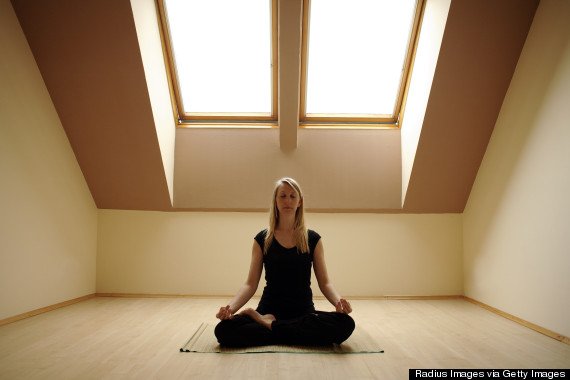
If anyone knows a thing or two about creativity, it's David Lynch. Arguably one of the most brilliant film directors of our time, Lynch is best known for genre-defying, surrealist art-house films like Mulholland Drive, Blue Velvet, and Wild at Heart. His style is so original that it's even inspired its own adjective: "Lynchian."
Lynch is also an outspoken devotee of Transcendental Meditation, which he's practiced daily for over 40 years and brings to underserved populations through his work with the David Lynch Foundation. And the award-winning director says that meditation is his greatest secret to creative success.
"Transcendental meditation is for [all] human beings, and it transforms life for the good, no matter who you are or what your situation is," Lynch said in a Rolling Stone interview on Feb. 25. "It's a mental technique that allows [you] to dive deep within to the deepest level of life, which underlies all matter and mind. At the border of intellect, you transcend and experience that unbounded level of life: all positive, pure consciousness with qualities of intelligence, creativity, happiness, love, energy, and peace."
In 2006, Lynch penned a book illuminating his methods for achieving his greatest artistic visions. In Catching The Big Fish: Meditation, Consciousness and Creativity, Lynch likens ideas to fish: "If you want to catch a little fish, you can stay in the shallow water. But if you want to catch the big fish, you've got to go deeper."
For many of us who do creative work, lifestyles of stress, burnout, sleep deprivation and technology addiction can keep us from "going deeper." We multitask on texts, emails, news and social media -- without putting our full focus on anything we do -- and that can keep us on the surface of our thoughts and ideas. This can take a major toll on our creative thinking, which is never at its fullest potential if we're not accessing a deeper part of our consciousness. Lynch argues that meditation is the solution, the greatest tool we have for accessing our own brain power and diving into the subconsciousness where creativity resides.
Need a creative boost? Here are some of Lynch's best secrets to finding your personal vision from Catching The Big Fish.
1. Meditate, meditate, meditate.

Lynch is a longtime devotee of Transcendental Meditation, a practice that involves the repetition of a mantra during 20-minute, twice daily meditations. He swears that TM helps him to access a deeper level of consciousness, where all of his best ideas have come from. "Down deep, the fish are powerful and more pure. They're huge and abstract. And they're very beautiful," he writes.
But you don't have to take Lynch's word for it: The science has proven that mindfulness really can boost your brain power in a number of ways. A 2012 Dutch study found that certain meditation techniques can promote creative thinking. Mindfulness practice has been linked with improved memory and focus, emotional well-being, reduced stress and anxiety, and improved mental clarity -- all of which can lead to better creative thought.
Anyone can find time in their schedule to meditate, says Lynch -- you don't have to be sitting cross-legged in a special meditation room to enjoy the practice of mindfulness.
"You can meditate anywhere," says Lynch. "You can meditate in an airport, at work, anywhere you happen to be."
2. Slow down.

Few things crush creativity faster than excessive busyness -- research in organizational psychology has found that environments with high levels of time pressure can stifle creativity, and many of us know personally that our best ideas don't happen when we're stressed out and rushing from one deadline to another.
The world will likely only continue operating at an increasingly fast pace, so we must take it upon ourselves to slow down. Accessing one's deepest creativity, for Lynch, pretty much boils down to a simple piece of advice: "Keep your eye on the donut and not the hole." As Lynch explains, "If you keep your eye on the doughnut and do your work, that's all you can control. You can't control any of what's out there, outside yourself."
In other words, slow down, find time for your creative work, and let go of trying to keep up with endless emails, social media updates, to-do lists and obligations. They'll always be there -- it's your job to find a way to slow down for long enough to do the work that's important to you.
3. Sleep.

It's a simple equation: People who sleep better are more creative. Lynch explains that sleep is "really important" to his creative process. "You need to be able to rest the physiology to be able to work well and meditate well," says Lynch.
Writer Steven King also believes that sleep is crucial to the creative process and can help to release what he calls the "repressed imagination." King wrote in On Writing: A Memoir on the Craft:
In both writing and sleeping, we learn to be physically still at the same time we are encouraging our minds to unlock from the humdrum rational thinking of our daytime lives. And as your mind and body grow accustomed to a certain amount of sleep each night — six hours, seven, maybe the recommended eight -- so can you train your waking mind to sleep creatively and work out the vividly imagined waking dreams which are successful works of fiction.
The evidence that sleep deprivation disrupts creativity isn't just anecdotal: A number of scientific studies have found that sleep is essential for learning and creativity. Sleep helps the brain to consolidate memories so that we can later retrieve them more easily, and it also helps us reorganize and reconfigure memories so we can come up with new and original ideas.
4. Cultivate compassion.

Meditation can seem like a selfish pursuit -- one that cuts us off from others and the world around us as we retreat into our inner selves. But Lynch argues that meditation is anything but selfish, and for that reason, it can boost your creativity.
"Compassion, appreciation for others, and the capacity to help others are enhanced when you meditate," writes Lynch. "You start diving down and experiencing this ocean of pure love, pure peace -- you could say pure compassion. You experience that, and know it by being it. Then you go out into the world, and you can really do something for people."
Research has found that love and creativity are closely connected -- a 2009 study published in the Personality and Social Psychology Bulletin demonstrated that participants primed with thoughts of love had high levels of creative insights compared to those who thought of lust and control-group subjects. "Love enhances global processing and creative thinking," the researchers concluded.